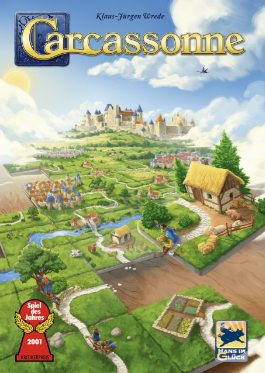
Carcassonne is a tile-based German-style board game for two to five players, designed by Klaus-Jürgen Wrede and published in 2000 by Hans im Glück in German and by Rio Grande Games and Z-Man Games (currently) in English. It received the Spiel des Jahres and the Deutscher Spiele Preis awards in 2001.

A meeple is a small board-game piece, usually with a stylized human form. They are usually made from wood and painted in bright colors. Meeples have been called an icon of German-style board games ("Eurogames"). The word is a contraction of "my people".
Blue Moon is a German collectible card game (CCG) designed by Reiner Knizia and published by Kosmos and Fantasy Flight Games in 2004.

Small World is a board game designed by Philippe Keyaerts, Illustrated by Miguel Coimbra and Cyrille Daujean as graphic designer, and published by Days of Wonder in 2009. The game is a reworking of Keyaerts' 1999 game Vinci. Small World has won several awards, including Games magazine 2010 Game of the Year.
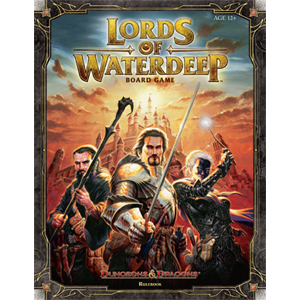
Lords of Waterdeep is a German-style board game designed by Peter Lee and Rodney Thompson and published by Wizards of the Coast in 2012. The game is set in Waterdeep, a fictional city in the Forgotten Realms campaign setting for the Dungeons & Dragons role-playing game. Players take the roles of the masked rulers of Waterdeep, deploying agents and hiring adventurers to complete quests and increase their influence over the city.

Hanabi is a cooperative card game created by French game designer Antoine Bauza and published in 2010. Players are aware of other players' cards but not their own, and attempt to play a series of cards in a specific order to set off a simulated fireworks show. The types of information that players may give to each other is limited, as is the total amount of information that can be given during the game. In 2013, Hanabi won the Spiel des Jahres, an industry award for best board game of the year.

Concept is a deduction party board game released in 2013. The game was designed by Alain Rivollet and Gaëtan Beaujannot and published by Repos Production. It has collected multiple awards and nominations including the Jeu de l'Année prize in Cannes in 2014.
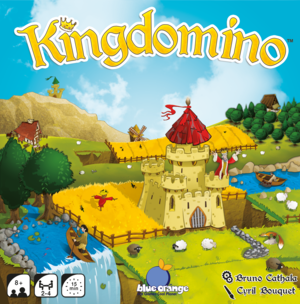
Kingdomino is a 2016 tile board game for 2-4 players designed by Bruno Cathala and published by Blue Orange Games. In this 15-20 minute, family-oriented game, players build a five by five kingdom of oversized domino-like tiles, making sure as they place each tile that one of its sides connects to a matching terrain type already in play. The game was critically successful and won the 2017 Spiel des Jahres award, and was followed by several spin-offs and expansions.
Caverna: The Cave Farmers is a 2013 board game designed by Uwe Rosenberg. It is a complex worker placement strategy game that shares similarities in gameplay and theme with his earlier board game, Agricola, The game's theme revolves around helping a small dwarf family to settle a cave and nearby woodlands and to develop the setting through furnishing caves as well as converting forests into meadows, fields and pastures. Caverna received positive reviews from critics, and two major expansions have been released for the game.
Parks is a board game with a theme based on the national parks of the United States, published by Keymaster Games. The game's art was derived from the Fifty-Nine Parks Print Series.
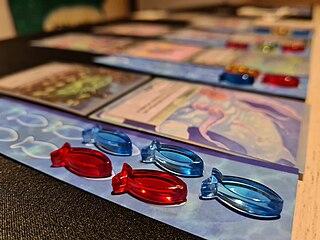
Oceans is a nature-themed strategy board game published in 2020 by North Star Games. It is a game in the Evolution series.

Broom Service is a role selection board game designed by Andreas Pelikan and Alexander Pfister, and published by Ravensburger. It won the 2015 Kennerspiel, the Spiel des Jahres connoisseurs game of the year award.

Suburbia is a city-building tile-laying board game designed by Ted Alspach and published in 2012 by Bézier Games.

Isle of Skye: From Chieftain to King is a tile-laying board game designed by Alexander Pfister and Andreas Pelikan that was published in 2015. It uses the Isle of Skye as its setting, with players representing clan chieftains each vying to build a kingdom.

Cartographers is a roll and write board game designed by Jordy Adan and published in 2019 by Thunderworks Games. It is part of the Roll Player universe. In the game, players aim to draw terrains based on drawn cards that award points based on the relevant letter cards. The game received positive reviews, and was nominated for the Kennerspiel des Jahres, but lost to The Crew. It was also runner-up to Parks for the Best Family Game of the 2019 Board Game Quests Awards. An app for solitary play was released in 2020.
Dragomino is a children's tile-laying board game designed by Bruno Cathala, Marie Fort, and Wilfried Fort and published by Blue Orange Games. It is based on Kingdomino.
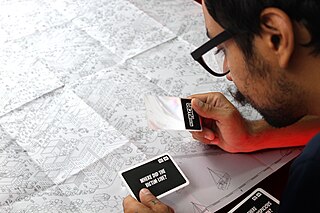
MicroMacro: Crime City is a cooperative tabletop crime-solving hidden object game designed by Johannes Sich and published in 2020 by Edition Spielwiese. The game received positive reviews and won the Spiel des Jahres in 2021. A sequel to the game, MicroMacro: Crime City – Full House was released in August 2021.
Cytosis is a cell biology worker placement board game designed by John Coveyou and published in 2017 by Genius Games. The game's development was funded via a crowdfunding campaign on Kickstarter.
Viticulture is a worker placement board game published by Stonemaier Games in 2013. The game's design was crowdfunded via a campaign on Kickstarter, with the concept of players building an Italian vineyard. Upon its release, Viticulture received praise for its engagement, but its luck was critiqued. Several expansions and reprints were later released.













